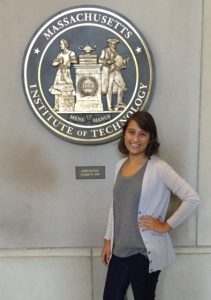 Project
Project
Characterizing Neural Adaptation in Autism Spectrum Disorder
Laboratories
John Gabrieli, Ph.D., Pawan Sinha, Ph.D.
Biographical information
Anila received a B.A. in Psychology from Georgetown University in 2012. In 2017, she completed her Ph.D. in Behavior, Cognition, and Neuroscience from American University in the lab of Dr. Catherine Stoodley. As a doctoral student, Anila’s research focused on the role of the cerebellum in typical and ayptical development including neurodevelopmental disorders such as autism. In her current work, Anila uses fMRI to investigate the neural basis of comorbidities in neurodevelopmental disorders such as dyslexia, dyscalculia, and ADHD. As a Simons Fellow, Anila will use functional neuroimaging to investigate neural adaptation in autism spectrum disorders.
Current Work
It has been suggested that individuals with ASD are less able than typically-developing (TD) individuals to predict events and optimize their behavior based on predictions. Here, I propose to test the hypothesis that adults with ASD show reduced neural adaptation across multiple domains. Neural adaptation could be a brain mechanism that supports prediction by differentiating between repeating and novel events. Neural adaptation impairments are thought to contribute to multiple psychiatric and neurodevelopmental disorders, including schizophrenia and dyslexia, and reduced neural adaptation is associated with increased symptom severity in ASD. This research aims to test the scope and limits of the hypothesized deficit in neural adaptation, probe the mechanism of reduced adaptation, and examine the dimensional relation of neural adaptation to ASD traits in both typically-developing adults and adults with autism regardless of diagnosis. Given the pervasiveness of neural adaptation deficits across neurodevelopmental disorders, identifying mechanisms and behavioral correlates of neural adaptation could inform future trans-diagnostic clinical treatments.
